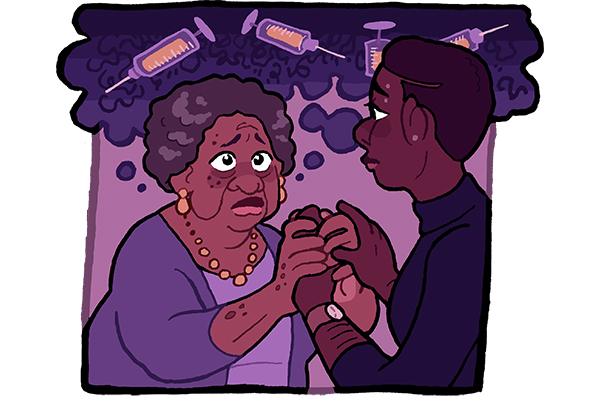Different communities can be skeptical over efficiency of COVID-19 vaccine due to past medical malpractices
February 3, 2021
PJ Chukwurah couldn’t look away from his phone screen, and his eyes were glued to his results: he was positive for COVID-19.
“I was dying. I had chest pain, coughing and (I) continuously sweat. I couldn’t sleep,” business management junior Chukwurah said. “It’s definitely a bad experience, and I wouldn’t wish it upon anyone.”
Chukwurah felt hesitant about the COVID-19 vaccine until he contracted the virus and experienced its symptoms.
The speedy approval of the COVID-19 vaccine by the Food and Drug Administration made Chukwurah and his friends skeptical of its safety. Vaccines usually follow a 10-15 year timeline of development and approval, but because of existing research and international collaboration, the COVID-19 vaccine was approved in only a year .
Citing the Tuskegee experiment, beginning in 1932, where 600 Black participants were unknowingly injected with syphilis, Chukwurah said past medical malpractice toward Black people made him hesitant to get the vaccine.
“(My friends and I) want to see people of a higher (social) status (get the vaccine) first so we can see it’s safe,” Chukwurah said. “My roommate said he wants to see Obama take it before he does.”
Dr. Steve Abrams, a pediatrics professor at Dell Medical School, said Chukwurah isn’t alone in his concern, and certain demographics are wary of the COVID-19 vaccine due to medical research conducted improperly in the past.
But Abrams and his colleagues said the COVID-19 vaccine is safe for all groups, including those disproportionately affected by the virus.
When measles broke out across the U.S. in 2019, a magazine called “The Vaccine Safety Handbook” was passed around Orthodox Jewish communities in New York by rabbis. The guide included statements about how the measles vaccine contained “monkey, rat and pig DNA,” which isn’t conducive to the Kosher diet, according to The New York Times.
In German concentration camps during the Holocaust, inmates were tested for antibodies against contagious diseases such as malaria and tuberculosis. A minimum of 15,754 documented victims between 1942-1945 were subjected to these experiments.
Olga Briceño, an international relations and global studies sophomore, said she also plans on receiving the COVID-19 vaccine despite her parents’ beliefs.
Briceño said her mother grew up in a rural town in Venezuela where people were used to treating themselves when sick. Doctors and hospitals were obsolete and vaccines were unheard of.
“Any time a family member is sick, soup is the medicine,” Briceño said. “No hospitals, no prescriptions, no doctor — just soup and rest.”
Briceño said her mother didn’t believe vaccines were effective, and Briceño hadn’t been vaccinated until she attended UT in 2019.
“She questions every vaccine, even ones that have been around for a while,” Briceño said. “(My mother) says, ‘We don’t know the effects,’ or ‘Who knows what they put in it.’ She’s very superstitious.’”
Although Chukwurah and Briceño understand vaccine concerns, they said they are not against vaccines and plan on receiving the COVID-19 vaccine when they are eligible.
“I understand there are a lot of unknowns with the vaccine,” Chukwurah said. “But this pandemic is not a joke. We have roles in our community to help prevent the spread of COVID-19, and as we do our role in receiving the vaccine, we need to have faith the government is doing their role in protecting us.”
Editor’s Note: A source has been removed from this story for the privacy of their family. The Texan regrets this error.











